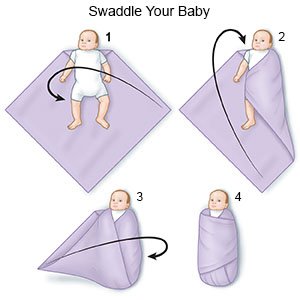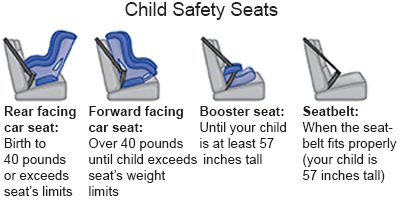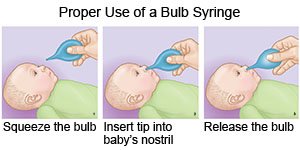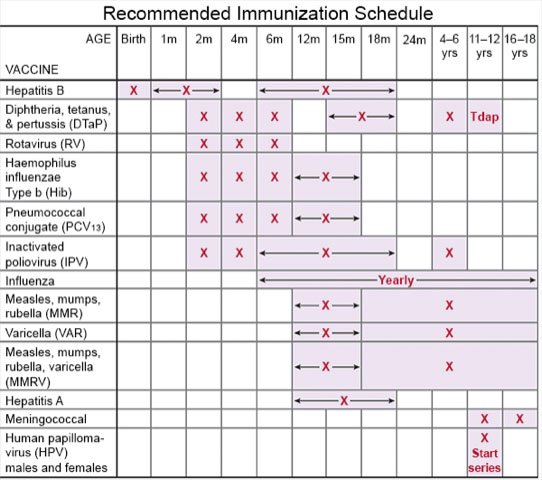Well Child Visit at 1 Month
Medically reviewed by Drugs.com. Last updated on May 6, 2024.
What is a well child visit?
A well child visit is when your child sees a pediatrician to prevent health problems. Well child visits are used to track your child's growth and development. It is also a time for you to ask questions and to get information on how to keep your child safe. Write down your questions so you remember to ask them. Your child should have regular well child visits from birth to 17 years.
What development milestones may my baby reach by 1 month?
Each baby develops at his or her own pace. Your baby may have already reached the following milestones, or he or she may reach them later:
- Focus on faces or objects, and follow them if they move
- Respond to sound, such as turning his or her head toward a voice or noise or crying when he or she hears a loud noise
- Move his or her arms and legs more, or in response to people or sounds
- Grasp an object placed in his or her hand
- Lift his or her head for short periods when he or she is on his or her tummy
What can I do to help my baby grow and develop?
- Put your baby on his or her tummy when he or she is awake and you are there to watch. Tummy time will help your baby develop muscles that control his or her head. Never leave your baby when he or she is on his or her tummy.
- Talk to and play with your baby. This will help you bond with your child. Your voice and touch will help your baby trust you.
- Help your baby develop a healthy sleep-wake cycle. Your baby needs sleep to stay healthy and grow. Create a routine for bedtime. Bathe and feed your baby right before you put him or her to bed. This will help him or her relax and get to sleep easier. Put your baby in his or her crib when he or she is awake but sleepy.
- Find resources to help care for your baby. Talk to your baby's pediatrician if you have trouble affording food, clothing, or supplies for your baby. Community resources are available that can provide you with supplies you need to care for your baby.
What can I do when my baby cries?
Your baby may cry because he or she is hungry. He or she may have a wet diaper, or feel hot or cold. He or she may cry for no reason you can find. Your baby may cry more often in the evening or late afternoon. It can be hard to listen to your baby cry and not be able to calm him or her down. Ask for help and take a break if you feel stressed or overwhelmed. Never shake your baby to try to stop his or her crying. This can cause blindness or brain damage. The following may help comfort your baby:
- Hold your baby skin to skin and rock him or her, or swaddle him or her in a soft blanket.

- Gently pat your baby's back or chest. Stroke or rub his or her head.
- Quietly sing or talk to your baby, or play soft, soothing music.
- Put your baby in his or her car seat and take him or her for a drive, or go for a stroller ride.
- Burp your baby to get rid of extra gas.
- Give your baby a soothing, warm bath.
How should I lay my baby down to sleep?
It is very important to lay your baby down to sleep in safe surroundings. This can greatly reduce his or her risk for SIDS. Tell grandparents, babysitters, and anyone else who cares for your baby the following rules:
- Put your baby on his or her back to sleep. Do this every time he or she sleeps (naps and at night). Do this even if he or she sleeps more soundly on his or her stomach or on his or her side. Your baby is less likely to choke on spit-up or vomit if he or she sleeps on his or her back.

- Put your baby on a firm, flat surface to sleep. Your baby should sleep in a crib, bassinet, or cradle that meets the safety standards of the Consumer Product Safety Commission (CPSC). Do not let him or her sleep on pillows, waterbeds, soft mattresses, quilts, beanbags, or other soft surfaces. Move your baby to his or her bed if he or she falls asleep in a car seat, stroller, or swing. He or she may change positions in a sitting device and not be able to breathe well.
- Put your baby to sleep in a crib or bassinet that has firm sides. The rails around your baby's crib should not be more than 2⅜ inches apart. A mesh crib should have small openings less than ¼ inch.
- Put your baby in his or her own bed. A crib or bassinet in your room, near your bed, is the safest place for your baby to sleep. Never let him or her sleep in bed with you. Never let him or her sleep on a couch or recliner.
- Do not leave soft objects or loose bedding in your baby's crib. His or her bed should contain only a mattress covered with a fitted bottom sheet. Use a sheet that is made for the mattress. Do not put pillows, bumpers, comforters, or stuffed animals in his or her bed. Dress your baby in a sleep sack or other sleep clothing before you put him or her down to sleep. Avoid loose blankets. If you must use a blanket, tuck it around the mattress.
- Do not let your baby get too hot. Keep the room at a temperature that is comfortable for an adult. Never dress him or her in more than 1 layer more than you would wear. Do not cover his or her face or head while he or she sleeps. Your baby is too hot if he or she is sweating or his or her chest feels hot.
- Do not raise the head of your baby's bed. Your baby could slide or roll into a position that makes it hard for him or her to breathe.
What can I do to keep my baby safe in the car?
- Always place your child in a rear-facing car seat. Choose a seat that meets the Federal Motor Vehicle Safety Standard 213. Make sure the child safety seat has a harness and clip. Also make sure that the harness and clips fit snugly against your child. There should be no more than a finger width of space between the strap and your child's chest. Ask your pediatrician for more information on car safety seats.

- Always put your child's car seat in the back seat. Never put your child's car seat in the front. This will help prevent him or her from being injured in an accident.
How can I keep my baby safe at home?
- Never leave your baby in a playpen or crib with the drop-side down. Your baby could fall and be injured. Make sure that the drop-side is locked in place.
- Always keep 1 hand on your baby when you change his or her diaper or dress him or her. This will prevent him or her from falling from a changing table, counter, bed, or couch.
- Keeping hanging cords or strings away from your baby. Make sure there are no curtains, electrical cords, or strings, hanging in your baby's crib or playpen.
- Do not put necklaces or bracelets on your baby. Your baby may be strangled by these items.
- Do not smoke near your baby. Do not let anyone else smoke near your baby. Do not smoke in your home or vehicle. Smoke from cigarettes or cigars can cause asthma or breathing problems in your baby. Ask your pediatrician for information if you currently smoke and need help to quit.
- Take an infant CPR and first aid class. These classes will help teach you how to care for your baby in an emergency. Ask your baby's pediatrician where you can take these classes.
What can I do to prevent my baby from getting sick?
- Do not give aspirin to children younger than 18 years. Your child could develop Reye syndrome if he or she has the flu or a fever and takes aspirin. Reye syndrome can cause life-threatening brain and liver damage. Check your child's medicine labels for aspirin or salicylates.Do not give your baby medicine unless directed by his or her pediatrician. Ask for directions if you do not know how to give the medicine. If your baby misses a dose, do not double the next dose. Ask how to make up the missed dose.
- Wash your hands before you touch your baby. Use an alcohol-based hand sanitizer or soap and water. Wash your hands after you change your baby's diaper and before you feed him or her.

- Ask all visitors to wash their hands before they touch your baby. Have them use an alcohol-based hand sanitizer or soap and water. Tell friends and family not to visit your baby if they are sick.
What can I do to help my baby get enough nutrition?
- Continue to take a prenatal vitamin or daily vitamin if you are breastfeeding. These vitamins will be passed to your baby when you breastfeed him or her.
- Feed your baby breast milk or formula that contains iron for 4 to 6 months. Breast milk gives your baby the best nutrition. It also has antibodies and other substances that help protect your baby's immune system. Do not give your baby anything other than breast milk or formula. Your baby does not need water or other food at this age.
- Feed your baby when he or she shows signs of hunger. He or she may be more awake and may move more. He or she may put his or her hands up to his or her mouth. He or she may make sucking noises. Crying is normally a late sign that your baby is hungry.
- Breastfeed or bottle feed your baby 8 to 12 times each day. He or she will probably want to drink every 2 to 3 hours. Wake your baby to feed him or her if he or she sleeps longer than 4 to 5 hours. If your baby is sleeping and it is time to feed, lightly rub your finger across his or her lips. You can also undress him or her or change his or her diaper. Your baby may eat more when he or she is 6 to 8 weeks old. This is caused by a growth spurt during this age.
- If you are breastfeeding, wait until your baby is 4 to 6 weeks old to give him or her a bottle. This will give your baby time to learn how to breastfeed correctly. Have someone else give your baby his or her first bottle. Your baby may need time to get used the bottle's nipple. You may need to try different bottle nipples with your baby. When you find a bottle nipple that works well for your baby, continue to use this type.
- Do not use a microwave to heat your baby's bottle. The milk or formula will not heat evenly and will have spots that are very hot. Your baby's face or mouth could be burned. You can warm the milk or formula quickly by placing the bottle in a pot of warm water for a few minutes.
- Do not prop a bottle in your baby's mouth or let him or her lie flat during feeding. This may cause him or her to choke. Always hold the bottle in your baby's mouth with your hand.
- Your baby will drink about 2 to 4 ounces of formula at each feeding. Your baby may want to drink a lot one day and not want to drink much the next.
- Your baby will give you signs when he or she has had enough. Stop feeding your baby when he or she shows signs that he or she is no longer hungry. Your baby may turn his or her head away, seal his or her lips, spit out the nipple, or stop sucking. Your baby may fall asleep near the end of a feeding. If this happens, do not wake him or her.
- Do not overfeed your baby. Overfeeding means your baby gets too many calories during a feeding. This may cause him or her to gain weight too fast. Do not try to continue to feed your baby when he or she is no longer hungry.
- Do not add baby cereal to the bottle. Overfeeding can happen if you add baby cereal to formula or breast milk. You can make more if your baby is still hungry after he or she finishes a bottle.
- Burp your baby between feedings or during breaks. Your baby may swallow air during breastfeeding or bottle-feeding. Gently pat his or her back to help him or her burp.
- Your baby should have 5 to 8 wet diapers every day. The number of wet diapers will let you know that your baby is getting enough breast milk. Your baby may have 3 to 4 bowel movements every day. Your baby's bowel movements may be loose if you are breastfeeding him or her. At 6 weeks, breastfed infants may only have 1 bowel movement every 3 days.
- Wash bottles and nipples with soap and hot water. Use a bottle brush to help clean the bottle and nipple. Rinse with warm water after cleaning. Let bottles and nipples air dry. Make sure they are completely dry before you store them in cabinets or drawers.
- Get support and more information about breastfeeding your baby.
- American Academy of Pediatrics
345 Park Boulevard
Itasca , IL 60143
Phone: 1- 800 - 433-9016
Web Address: http://www.aap.org
- La Leche League International
957 North Plum Grove Road
Schaumburg , IL 60173
Phone: 1- 847 - 519-7730
Phone: 1- 800 - 525-3243
Web Address: http://www.lalecheleague.org
- American Academy of Pediatrics
How do I give my baby a tub bath?
Use a baby bathtub or clean, plastic basin for the first 6 months. Wait to bathe your baby in an adult bathtub until he or she can sit up without help. Bathe your baby 2 or 3 times each week during the first year. Bathing more often can dry out his or her delicate skin.
- Never leave your baby alone during a tub bath. Your baby can drown in 1 inch of water. If you must leave the room, wrap your baby in a towel and take him or her with you.
- Keep the room warm. The room should be warm and free of drafts. Close the door and windows. Turn off fans to prevent drafts.
- Gather your supplies. Make sure you have everything you need within easy reach. This includes baby soap or shampoo, a soft washcloth, and a towel.
- If you use a baby bathtub or basin, set it inside an adult bathtub or sink. Do not put the tub on a countertop. The countertop may become slippery and the tub can fall off.
- Fill the tub with 2 to 3 inches of water. Always test the water temperature before you bathe your baby. Drip some water onto your wrist or inner arm. The water should feel warm, not hot, on your skin. If you have a bath thermometer, the water temperature should be 90°F to 100°F (32.3°C to 37.8°C). Keep the hot water heater in your home set to less than 120°F (48.9°C). This will help prevent your baby from being burned.
- Slowly put your baby's body into the water. Keep his or her face above the water level at all times. Support the back of your baby's head and neck if he or she cannot hold his or her head up. Use your free hand to wash your baby.
- Wash your baby's face and head first. Use a wet washcloth and no soap. Rinse off his or her eyelids with water. Use a clean part of the washcloth for each eye. Wipe from the inside of the eyes and out toward the ears. Wash behind and around your baby's ears. Wash your baby's hair with baby shampoo 1 or 2 times each week. Rinse well to get rid of all the shampoo. Pat his or her face and head dry before you continue with the bath.
- Wash the rest of your baby's body. Start with his or her chest. Wash under any skin folds, such as folds on his or her neck or arms. Clean between his or her fingers and toes. Wash your baby's genitals and bottom last. Follow instructions on how to wash your baby boy's penis after a circumcision.
- Rinse the soap off and dry your baby. Soap left on your baby's skin can be irritating. Rinse off all of the soap. Squeeze water onto his or her skin or use a container to pour water on his or her body. Pat him or her dry and wrap him or her in a blanket. Do not rub his or her skin dry. Use gentle baby lotion to keep his or her skin moist. Dress your baby as soon as he or she is dry so he or she does not get cold.
How do I clean my baby's ears and nose?
- Use a wet washcloth or cotton ball to clean the outer part of your baby's ears. Do not put cotton swabs into your baby's ears. These can hurt his or her ears and push earwax in. Earwax should come out of your baby's ear on its own. Talk to your baby's pediatrician if you think your baby has too much earwax.
- Use a rubber bulb syringe to suction your baby's nose if he or she is stuffed up. Point the bulb syringe away from his or her face and squeeze the bulb to create a vacuum. Gently put the tip into one of your baby's nostrils. Close the other nostril with your fingers. Release the bulb so that it sucks out the mucus. Repeat if necessary. Boil the syringe for 10 minutes after each use. Do not put your fingers or cotton swabs into your baby's nose.

How do I care for my baby's eyes?
A newborn baby's eyes usually make just enough tears to keep his or her eyes wet. By 7 to 8 months old, your baby's eyes will develop so they can make more tears. Tears drain into small ducts at the inside corners of each eye. A blocked tear duct is common in newborns. A possible sign of a blocked tear duct is a yellow sticky discharge in one or both of your baby's eyes. Your baby's pediatrician may show you how to massage your baby's tear ducts to unplug them.
How do I care for my baby's fingernails and toenails?
Your baby's fingernails are soft, and they grow quickly. You may need to trim them with baby nail clippers 1 or 2 times each week. Be careful not to cut too closely to his or her skin because you may cut the skin and cause bleeding. It may be easier to cut your baby's fingernails when he or she is asleep. Your baby's toenails may grow much slower. They may be soft and deeply set into each toe. You will not need to trim them as often.
How can I care for myself during this time?
- Go for your postpartum checkup 6 weeks after you deliver. Visit your healthcare providers to make sure you are healthy. They can help you create meal and exercise plans for yourself. Good nutrition and physical activity can help you have the energy to care for yourself and your baby. Talk to your obstetrician or midwife about any concerns you have about you or your baby.
- Join a support group. It may be helpful to talk with other women who have babies. You may be able to share helpful information with one another.
- Begin to plan your return to work or school. Arrange for childcare for your baby. Talk to your baby's pediatrician if you need help finding childcare. Make a plan for how you will pump your milk during the work or school day. Plan to leave plenty of breast milk with adults who will care for your baby.
- Find time for yourself. Ask a friend, family member, or your partner to watch the baby. Do activities that you enjoy and help you relax.
- Ask for help if you feel sad, depressed, or very tired. These feelings should not continue after the first 1 to 2 weeks after delivery. They may be signs of postpartum depression, a condition that can be treated. Treatment may include talk therapy, medicines, or both. Talk to your baby's pediatrician so you can get the help you need. Tell him or her about the following or any other concerns you have:
- When emotional changes or depression started, and if it is getting worse over time
- Problems you are having with daily activities, sleep, or caring for your baby
- If anything makes you feel worse, or makes you feel better
- Feeling that you are not bonding with your baby the way you want
- Any problems your baby has with sleeping or feeding
- If your baby is fussy or cries a lot
- Support you have from friends, family, or others
Call your local emergency number (911 in the US) if:
- You feel like hurting your baby.
When should I contact my baby's pediatrician?
- Your baby's abdomen is hard and swollen, even when he or she is calm and resting.
- You feel depressed and cannot take care of your baby.
- Your baby's lips or mouth are blue and he or she is breathing faster than usual.
- Your baby's armpit temperature is higher than 99°F (37.2°C).
- Your baby's eyes are red, swollen, or draining yellow pus.
- Your baby coughs often during the day, or chokes during each feeding.
- Your baby does not want to eat.
- Your baby cries more than usual and you cannot calm him or her down.
- You feel that you and your baby are not safe at home.
- You have questions or concerns about caring for your baby.
What do I need to know about my baby's next well child visit?
Your baby's pediatrician will tell you when to bring him or her in again. The next well child visit is usually at 2 months. Contact your baby's pediatrician if you have questions or concerns about your baby's health or care before the next visit. Your baby may need vaccines at the next well child visit. Your provider will tell you which vaccines your baby needs and when your baby should get them.
 |
Care Agreement
You have the right to help plan your baby's care. Learn about your baby's health condition and how it may be treated. Discuss treatment options with your baby's healthcare providers to decide what care you want for your baby. The above information is an educational aid only. It is not intended as medical advice for individual conditions or treatments. Talk to your doctor, nurse or pharmacist before following any medical regimen to see if it is safe and effective for you.© Copyright Merative 2024 Information is for End User's use only and may not be sold, redistributed or otherwise used for commercial purposes.
Learn more about Well Child Visit at 1 Month
Care guides
Further information
Always consult your healthcare provider to ensure the information displayed on this page applies to your personal circumstances.
